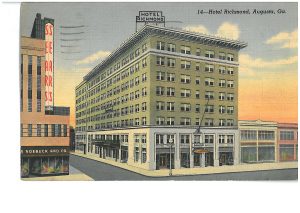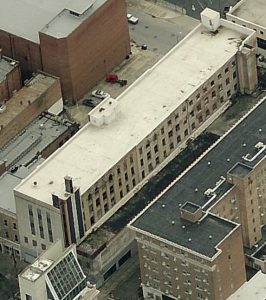 Former J. C. Penney’s Department Store
Former J. C. Penney’s Department Store
Address: 732-738 Broad Street
Owner: Privately Owned
History and Significance: Constructed as part of the Albion Hotel in 1900 by William F. Denny, who also designed Old First Baptist Church, the building is first listed in the city directories at The JB White Company in 1904 with the street address of 732-736 Broad Street. Saturday November 26, 1921, a massive fire erupted at 1:50am at the corner of Eighth and Broad Streets. The Harrison Building, Johnson Building, The Albion Hotel, and The Chronicle Building were considered a total loss and the estimated damage to the area was $1,500,000. The newspaper article reported that when the Albion Hotel caught fire at 3:30am, the J. B. White and Company’s building was threatened and at the time it was Augusta’s largest department store. The Art Deco façade that is currently on the Broad Street façade was added in 1922. The Augusta Chronicle reported on June 4, 1922, that the J. B. White & Company’s building would be having a grand opening one year after the devastating fire. Approximately 7,000 square feet of floor space was added and 230 feet of window displays was unveiled by President Frank. P. Gracey. The J. C. Penney department store began leasing the 83,000 square foot building in 1958 and in 1959 company founder, James Cash Penney, at the grand opening. The J. C. Penney Department store left the location in 1987 and moved to the newly constructed Augusta Mall.
Threat: Vacancy, development pressure from surrounding properties, condition continues to deteriorate
Potential Uses: Mixed use, commercial office or retail space, income-producing apartments
Preservation Tools: (1); A contributing resource in the Augusta Downtown Historic District, which is listed on the National Register of Historic Places, and is therefore eligible for all programs of the National Register which include available grant funds and tax incentives for certified rehabilitations; (2) located in the Downtown Augusta Historic District which means that any alteration to the exterior, including demolition, should be approved by the Augusta Richmond County Historic Preservation Commission.



